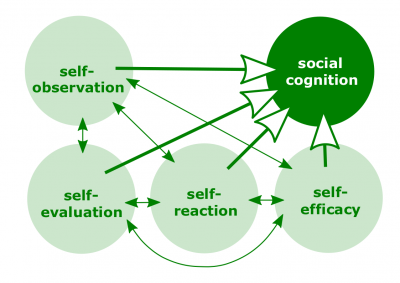Difference between revisions of "Social cognitive theory"
(Created page with "400px|thumb|right|[[Social cognitive theory]]Social cognitive theory (hereinafter, the ''Theory'') is a theory used in psychology, ...") |
(No difference)
|
Revision as of 03:41, 22 November 2018
Social cognitive theory (hereinafter, the Theory) is a theory used in psychology, education, and communication that suggests that portions of an individual's knowledge acquisition can be directly related to observing others within the context of social interactions, experiences, and outside media influences. According to this theory, social cognition is composed of four processes of goal realization: self-observation, self-evaluation, self-reaction, and self-efficacy. These components are interrelated and each have an effect on motivation and goal attainment.
Components
- Self-observation. - Observing oneself can inform and motivate. It can be used to assess one’s progress towards goal attainment as well as motivate behavioral changes. There are two important factors with regards to self observation; regularity and proximity. Regularity means the behavior should be continually observed whereas proximity means the behavior should be observed while it occurs, or shortly after. Alone, self observation is insufficient because motivation depends on one’s expectations of outcomes and efficacy (Zimmerman & Schunk, 2001).
- Self-evaluation - Comparing one's current performance with a desired performance or goal. Self evaluation is affected by the standards set and the importance of the goals. Goals must be specific and important; therefore, goals such as, "do your best" are vague and will not motivate. If one has little regard for their goal they will not evaluate performance. There are two types of self-evaluation standards: absolute and normative. For example, a grading scale would be an example of a fixed or absolute standard. A social comparison such as evaluating one’s behavior or performance against other individuals is an example of a normative standard (Zimmerman & Schunk, 2001). People gain satisfaction when they achieve goals that they value. When individuals achieve these goals, they are more likely to continue to make every effort since sub-standard performance will no longer provide satisfaction (Bandura, 1989).
- Self-reaction - Reactions to one’s performance can be motivating. If progress is deemed acceptable, then one will have a feeling of self-efficacy with regards to continuing, and will be motivated towards the achievement of their goal. A negative self evaluation may also be motivating in that one may desire to work harder providing that they consider the goal as valuable. Self reaction also allows a person to re-evaluate their goals in conjunction with their attainments (Bandura, 1989). If a person has achieved a goal, they are likely to re-evaluate and raise the standard (goal); whereas, if a person has not achieved the goal they are likely to re-evaluate and lower the standard (goal) to an achievable goal.
